Prepare for an RV road trip as a family by using these 15 tips. These tips will help you with everything from planning out the perfect route, to preparing an easy, delicious meal plan. Hopefully, this will help you to stay organized so that you can relax and enjoy your trip!
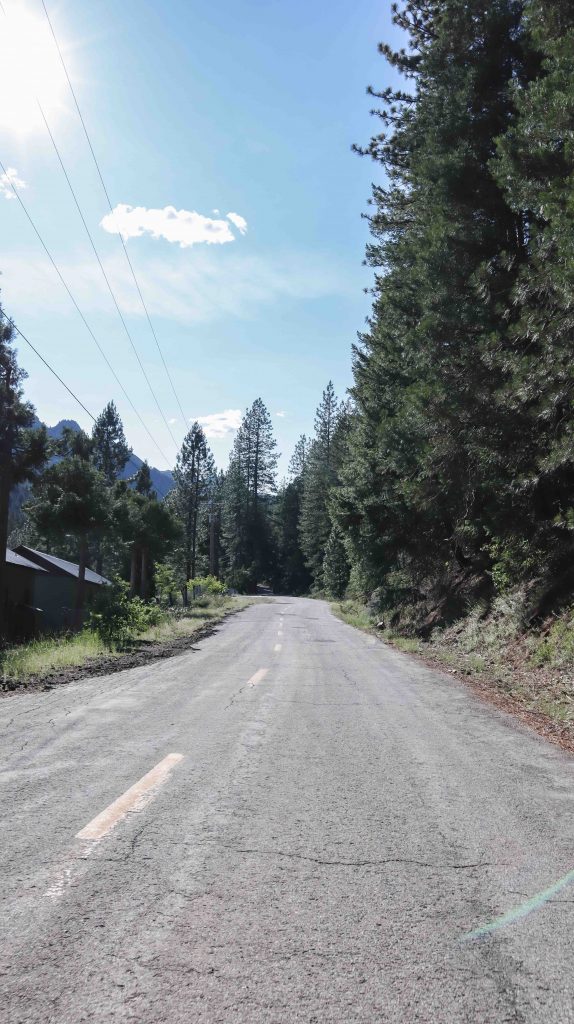
My husband and I recently took our third long RV road trip, after upgrading from a travel trailer to a 32 foot motorhome. We love camping and have learned so many tricks and tips for how to prepare for an RV road trip with our young children, but many of these tips can also be adapted for long car trips as well. So, let’s dive in!
1. Plan out the route for your RV road trip
The first thing to do to prepare for an RV road trip is to decide your main or final destination and the length of your trip. From there, you can get started planning out the rest of your stops and figure out how long you’d like to stay in each location. Now, I know that there is an argument for just finding a place to stop along your route, but in my personal opinion, it’s so much more relaxing to have each stop planned out in advance. Here are a few other things to consider while planning out your stops:
- Decide how many miles you want to travel each day. A good rule of thumb is to travel around 300 miles a day, and to stay in each location for at least 3 nights. I know from experience that staying somewhere for 2-3 nights after a long drive is so much more enjoyable!
- Next, identify any points of interest you’d like to see along the way.
- Then, using AAA Triptik, plug in your starting location, your final destination, and any points of interest that you know you want to see along the way. The site will then show you the best route to take. You can also set it to show you “route intervals” based on how often you’d like to stop. You can also use this tool to find gas stations, rest stops and campgrounds.
- Next, use the campground feature to find campgrounds near each interval. I always recommend booking each campsite as soon as you can, especially if you’re visiting during a holiday weekend. Not only will it ensure you find a site, but it will usually provide more options for what type of site is available to book as well. It’s important to book each location in order of when you plan on visiting because sometimes they won’t have availability for the entire time you’re hoping to stay.
- Lastly, if you can’t find a suitable campground, or you want to swing for something a little bit different Hipcamp and/or Harvest Hosts are great options! You can stay on a family farm, a vineyard, a brewery or private property. Some of our favorite stays have been at Hipcamp locations!
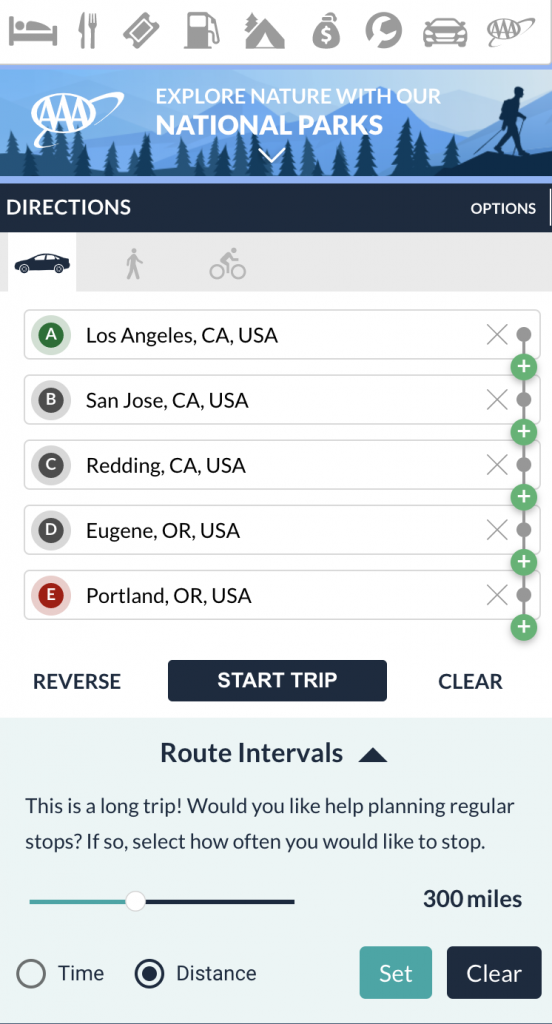
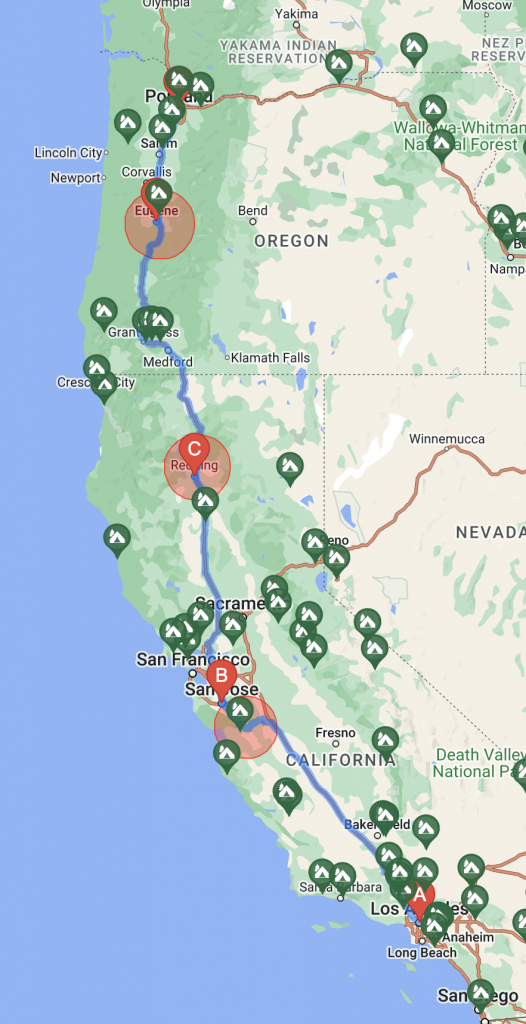
2. Set a budget for your RV road trip
Next, set a budget for how much you’re hoping to spend on food, gas, lodging (for RV parks etc.), and any other fun activities your family might want to participate in. This will obviously vary a lot, depending on your family, gas prices, how much you want to cook, and what kinds of activities you’re hoping to engage in. However, even if you don’t actually stick to your budget, planning this out will give you an idea of how much you’ll potentially be spending overall.
3. Create an Itinerary for your RV road trip
As you book each location, it’s helpful to create an itinerary for your trip. I like to write the number of miles to the next location, followed by the date of arrival, the name of the location, and the address. After I create my itinerary I like to print it out. I use it along with my meal plan (which I’ll discuss later), for a quick way to reference where we’re going, how long it will take to get there, and what we’ll be eating for the day.
4. Put Safety First
Before we leave on a trip with our RV, we always have our RV serviced, have the tires checked to make sure they’re not worn, and make sure that everything is in good working order. We also use this 6 sensor tire pressure monitoring system for peace of mind. Trust me, it’s a nightmare to try to fix things on the road when you don’t have access to tools (speaking from experience here), or to end up broken down on the side of the road with little kids. We also check signal lights, break lights, running lights and hazards every time before we leave for the next location. I would also highly recommend investing in roadside assistance.
5. Be Prepared for Emergencies, Injuries and Illness
I’ll never forget one of our road trips where my older daughter caught a gnarly flu. I was underprepared for illness and our choices for natural immune support at the local drug store were slim to none. I was kicking myself for not being better prepared. Since then, we keep the following on hand:
Essential Oils:
We also keep this first aid kit handy for any mishaps while we’re on the road along with Active Skin Repair, this bug bite sucker which sucks the poison out of mosquito bites, and this amish chickweed salve which stops the itch of bug bites instantly!
6. Bring a physical map or Download a map of your route
Once you’ve booked each stop, it’s a really good idea to invest in a good physical map, like this one, or to print or download maps of each drive you’ll be taking, just in case. I can’t tell you how many times we’ll be driving and all of a sudden, we have no service. Having a map and directions can save you from having to stress about losing service and getting lost.
7. Utilize a packing list
I have a basic packing list that I use for every camping trip that we take. It saves me so much time and ensures that I never forget anything. I like to organize our packing list by who the items are for, AND where the items are located in our home. This ensures that when I’m packing I’m not walking back and forth from room to room looking for what I need. For example, all of our sunscreen and aloe is in our girl’s bathroom, so I have them on the list next to our girl’s toiletries like shampoo and lotion. Then, when I go to pack shampoo and lotion, I grab the sunscreen and aloe as well. I place everything into a laundry basket, take loads into our RV, and put things where they belong.
8. Pack your clothes in bundles
I like to pack outfits for each family member in bundles. The bundles include a shirt, pants or shorts, and a pair of underwear. Then, I line the bundles up next to each other, that way you can see each outfit option when you’re getting dressed. You can place them into a suitcase, but I personally love bins like this, that stay open so you can easily find what you need. This simplifies morning time with kids and make sure that you always have an outfit that matches! And just in case you’re wondering, I like to store the socks next to the shoes!
9. Create a meal plan for your RV road trip
Because we like to eat as much homemade food as possible, it’s essential to create a meal plan for our trip. The meal plan helps me to create my grocery list, and it’s useful to know what meals I should make on what nights of our trip. For instance, the easiest (dump it in the pot and heat it up) meals are eaten on evenings after a long drive, whereas meals that may take a little more preparation like burgers, are cooked on nights where we’re relaxing at our campground. It’s also helpful to know when you need to pull a meal out of the freezer so that it’s thawed out for dinner that evening. Trust me, meal planning and prepping your food ahead of time makes meal time on your road trip healthy, easy and delicious! Find a copy of my free camping meal template down below.
10. Prepare and freeze food ahead of time
In order to get healthy meals on the picnic table each night, I prepare and freeze food as much as I possibly can ahead of time. I do this by doubling many of my recipes in the weeks leading up to our departure. This saves me SO much time and energy from having to making lots of separate meals, or having to cook while we’re on the road.
Breakfast:
- Bacon and eggs (We prep the bacon ahead of time and portion it out into vacuum sealed bags.)
- Green smoothie muffins
- Egg bites (Seen in the picture below.)
- Yogurt and homemade granola
- Banana bread
- Sausage breakfast burritos (I prepare the sausage & potato mixture beforehand and then add in the scrambled eggs later.)
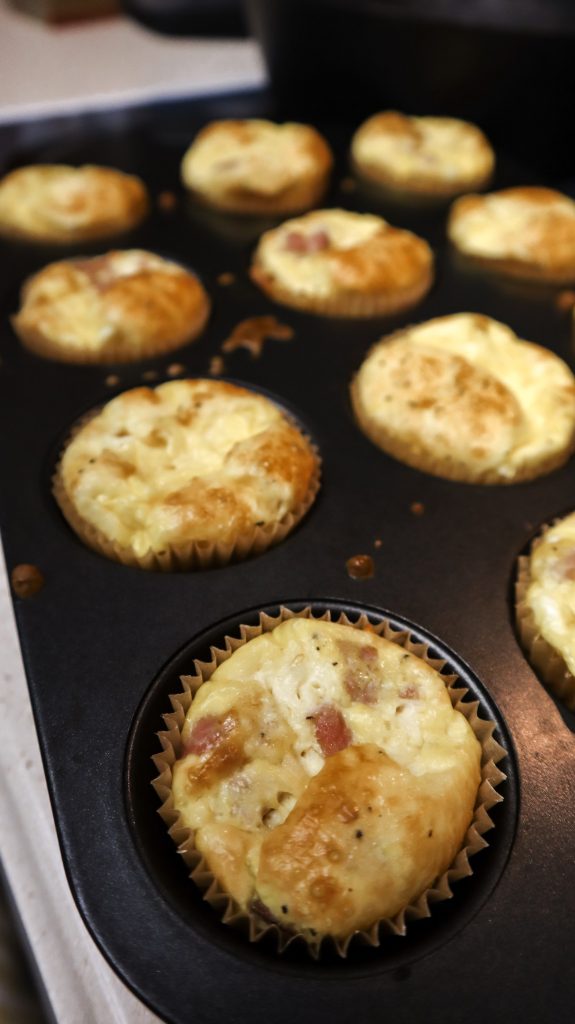
Lunch:
- Meat, cheese and crackers
- Tuna
- Hummus with veggies
- Sliced up fruit
- Peanut butter & jelly sandwiches (I love to prepare and freeze these for a quick, easy kid’s lunch.)
- Beef jerky
- Leftovers from dinner
Dinner:
- Spaghetti and meatballs (I prep and freeze the sauce and meatballs ahead of time.)
- Chili (I like to prep and freeze some cornbread muffins to go along with this meal.)
- Burgers
- Sausages with sautéed’ peppers and onions & watermelon
- Pulled pork sandwiches (I prep the meat ahead of time.)
- Salsa chicken tacos (I prep the meat ahead of time.)
- Any soup that you can freeze and reheat
11. Bring Snacks & activities to entertain your kids on the road
If you’ve traveled with kids for any length of time, you know that snacks and activities are an essential part of a preparing for a road trip with kids.
Snacks for your RV road trip
We like to keep our snacks as healthy and simple as possible. If you’re traveling in a car, or towing a trailer then it’s a good idea to pack some snacks and drinks in a cooler for easy access during your drives. Otherwise, you can store them in your RV fridge. Here are some ideas of (mostly) mess free, healthy snacks for the whole family:
- Cuties
- Apples
- Carrot sticks
- String cheese
- Fruit or veggie pouches
- Frozen yogurt tubes
- Pork rinds
- Meat sticks- These chicken maple ones are my favorite!
- Skout Organic Bars
- Dried seaweed
I also love purchasing a lot of our snacks from Thrive Market! It’s so easy to find foods that are organic and made without toxic seed oils. For example, their organic veggie sticks are made with organic coconut oil instead of sunflower oil. Click here to receive off 40% off your first Thrive Market order.
Activities for your RV road trip
Our girls each have one of these trays, which are the perfect size to fit over their lap while they sit in their car seats. It has a cupholder to hold their drinks, along with a caddy to store papers or activity books, and a ledge so that crayons and colored pencils don’t roll away. Then, I keep a container like this stocked with activities to keep them busy. Here are some of my favorite activities to keep the girls entertained during long drives:
- Melissa and Doug Magnetic Puzzles
- Magnetic Drawing Board
- Color Wonder Activity Books
- Quiet Book
- Take Along Bible Storyteller
- Pop Tube Dogs
- Pop It Blocks
- Reusable Puffy Sticker Books
- Found It Travel Card Game
- Picasso Double Sided Drawing Board
- Water Wow Books
12. Don’t forget fun outdoor toys and activities for when you arrive at your destination
We like to bigger items like bikes and scooters, but we also love to bring sidewalk chalk, bubble wands, small balls, sand toys, water blasters, and collapsible beach buckets for water play or water beads. We also enjoy playing board games and cards while we’re camping, so I always make sure to pack those as well.
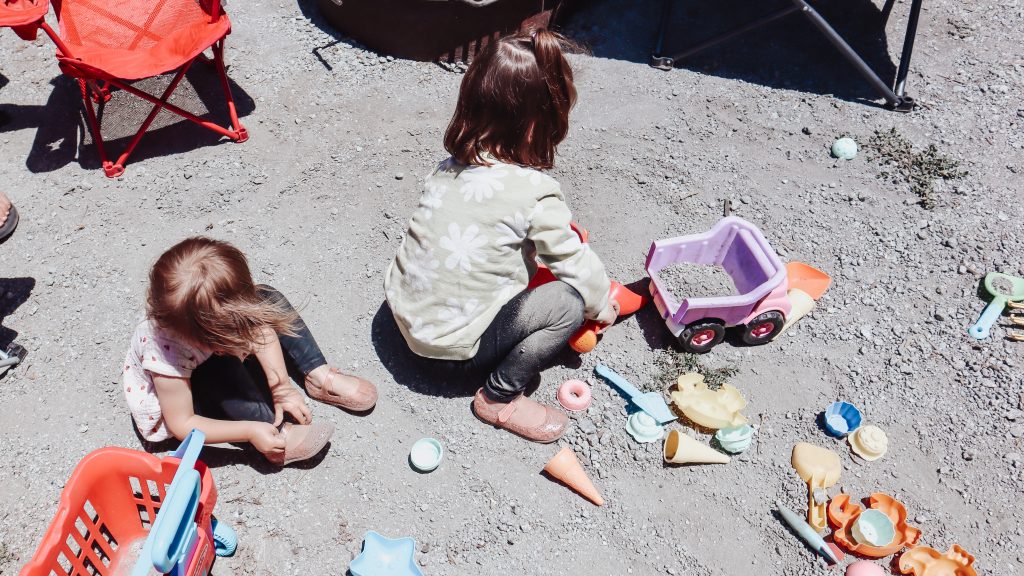
This post contains affiliate links, which means I make a small commission at no extra cost to you. See my full disclosure here.
13. Bring a sound machine
A sound machine is helpful in so many different scenarios. It’s useful if you have a little one napping in a carseat and want to drown out some of the talking and road noise, but it’s especially helpful at night to mask the sound of the RV door opening and closing, the sounds of the sink and toilet when someone needs to use the restroom, and the sound of snores if you deal with a family grizzly bear. Even if you don’t use a sound machine at home, I think it’s really useful to have one in such close quarters. Our favorite is this one. It’s not a “smart” sound machine, but the sounds are a lot more pleasant. Plus, they’re not on a loop like other popular sound machines.
14. Bring Buckets for Dishwashing and Showering
Sometimes we have full hookups, but sometimes we enjoy dry camping. In the case where you have access to a spigot or to fresh water, but you don’t want to fill up your gray water tank, a bucket can be a life saver! We have these for washing & rinsing our dishes, along with one of these for drying our dishes. We also had a large, flexible bucket to stand in while we showered, to collect the water so that we could save it from filling up our gray tank.
15. Have fun on your RV road trip!
This can’t be overstated. Camping is a lot of hard work, so don’t forget to set aside moments to enjoy yourself! I hope these tips and tricks are a blessing to you and your family!
What about you?
What are some of your favorite ways to prepare for an RV road trip with your family? Share with us below!

Making sure that we have a way to prepare snacks and other kinds of quick meals will really be important. I think this is exactly the kind of thing that we should try and manage as much as possible considering how tiring it can be to do some camping and my kids would need something quick to fill their stomachs. I’ll have those prepared when we go on trips to a local RV resort.